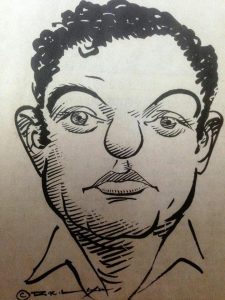His was the first play I performed in college when I foolishly forayed onto the stage. He was among the first writers I interviewed when I became a journalist. His was a regular face during theatre and cultural festivals, a tall dashing figure who walked the talk. I saw him many years later at the steel flyover satyagraha. His gait had slowed down a bit, but the nerve was as steely as as ever, even with that medical box strapped to him. And now he is gone.
It is very ironic that in death, a wordsmith often leaves us speechless. They are historians, opinion makers but most importantly, they have the responsibility of shaping the conscience of generations with their writings. And Girish Karnad was the most decorated of them all from his generation. So the immediate silence on his death this morning was deafening. Who’ll fill those shoes?
The most difficult part of writing an ode to a person – any person – is to talk about them in the past tense. And what does one write about a man like Karnad? His achievements fill the screen with the click of a button. Playwright, actor, director, thinker – he donned many hats in his life, with ease. He had opinions about politics, without being political like U R Ananthamurthy. He never shied from stating a contrary opinion, be it about Tagore or Naipaul.
But for us 80s kids, more than an intellectual, Karnad was first and foremost, Swamy’s father from ‘Malgudi Days’. The strict, stern South Indian parent that we were all scared of, who would not tell Swamy if the mangoes in his math sum were ripe or not. But he could not have been more different in person.
Manjunath Nayakar or Master Manjunath who had played Swamy, recalled an incident during the shoot. “There was a scene in Malgudi Days, in which I had to go up the stairs and tell him somebody burnt my cap at school. It was a very intense scene in which he would get angry with me. Now Girish uncle was always relaxed and joking with us kids, so we didn’t really look at him as an authoritarian figure. But when the camera rolled for that scene and he lost his temper, I really got scared that he was going to whack me. He realised that and the minute they yelled ‘cut’, he scooped me up, tickled me and said, “Why did you get scared?” His intuition as an actor was always on-point.”
Nayakar, who, at the age of five, was also directed by Karnad in the movie Utsav, remembers Karnad’s love for his roots. “In the 90s, Karnad disappeared from the entire circuit for a few years. Nobody knew where he was. It was only later that we found he had returned to his ancestral home in Dharwad to regroup. Our shooting for Utsav too happened in the middle of nowhere, near Kundapur. He had an innate pride of where he came from.”

Cartoonist R K Laxman’s take on Karnad. Pic: Pinterest
But Karnad was also a true-blue Bengalurean who enjoyed his filter coffee in the many Darshinis that dotted South Bengaluru. His home in JP Nagar was stacked with books from ceiling to floor. And many of these of books were from Bengaluru’s book-keeper T S Shanbagh of Premier Book shop.
In fact, when noted historian Ramachandra Guha hosted a lunch in honour of Shanbagh, Karnad’s wife Dr Saraswathy quipped that her marriage had survived despite Shanbagh’s book shop. She would drop Karnad off, strictly telling him not to buy anymore books, only to come back to a huge stack at the cash counter. After grumbling for a bit, she would add some of her own choices to that pile.
“He’d turn up three or four times a month to stack up on books. But he leaned towards literature than political writings. His own writings were very forward-looking,” remembers Shanbagh of his old associate. Probe him further about his impressions about Karnad, and you get one line, “He was a straight-speaking guy.”
This straight talk often got Karnad into controversies. But it did not faze him. “He did not believe in playing to the gallery. And if he didn’t like something, he’d tell straight up,” says writer Pratibha Nandakumar. He championed contrary viewpoints, even if those were against him. When Ranga Shankara hosted their annual theatre festival one year to honour Karnad’s writings, one of the theatre groups enacted a less-than-flattering interpretation of him and his play ‘Dreams of Tippu Sultan’. Karnad never reacted.
Regardless of whether we agreed with his ideas, opinions and politics, Karnad’s dissent has been the voice of a generation that started its fight against religious dogma. His views about dissent even when it was against him, taught us about the quiet dignity of being adversarial without being disrespectful. He even walked the talk in death, opting for a simple send-off rather than the pomp and show of a state funeral.
Those indeed are some very big shoes to fill.